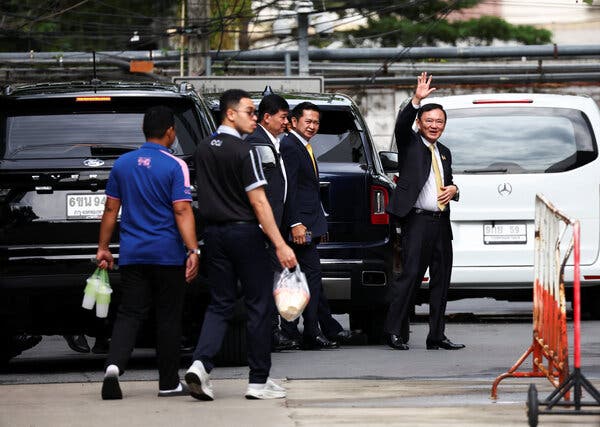A Thai court is set to announce a verdict on Friday regarding the royal defamation case involving Thaksin Shinawatra, a former prime minister whose political influence remains significant. Accused of insulting the monarchy, Mr. Thaksin faces a maximum penalty of 15 years in prison. This case marks him as one of the most prominent figures charged under Thailand’s stringent royal defamation laws, which are known for suppressing dissent.
The legal proceedings against Mr. Thaksin are viewed by many as politically motivated, indicative of the ongoing power struggle between him and Thailand’s royalist-military establishment. Supporters gathered outside the Criminal Court in Bangkok on Friday morning, demonstrating solidarity with the former prime minister.
Mr. Thaksin, a 76-year-old telecom billionaire, made his mark on Thai politics by implementing populist policies that resonated with rural voters, leading to his election as prime minister in 2001. His tenure was abruptly ended by a military coup in 2006, after which he fled Thailand. Despite his absence, political parties associated with him have consistently garnered the highest number of votes in national elections. This trend was interrupted in 2023 when the progressive Move Forward Party gained prominence.
The defamation charges stem from an interview Mr. Thaksin gave to the South Korean newspaper Chosun Ilbo, where he suggested that a “palace circle” orchestrated the coup against his sister, Yingluck Shinawatra, who served as prime minister from 2011 until her removal in another coup in 2014. At the time of the interview, Mr. Thaksin was residing in Dubai, beyond the reach of Thai authorities.
In a notable return to Thailand in August 2023, many observers interpreted Mr. Thaksin’s move as part of an agreement with the political establishment to keep the Move Forward Party from gaining power. Following his return, the Pheu Thai Party, associated with Mr. Thaksin, formed the new government, and he received a royal pardon for previous corruption convictions, which had led to an eight-year prison sentence—though he did not serve any time.
In June 2023, the indictment for the defamation charges was made public, which analysts view as a demonstration of the establishment’s influence over Mr. Thaksin. He is also facing separate charges under the Computer Crime Act for the online dissemination of the Chosun Ilbo interview.
The legal challenges extend beyond Mr. Thaksin. His daughter, Paetongtarn Shinawatra, was recently suspended from her role as prime minister by a court, and she may face further restrictions in her political career. Additionally, Mr. Thaksin’s six-month stay in a V.I.P. hospital suite has drawn criticism, with allegations that it allowed him to evade prison time.
As the court prepares to deliver its verdict, the outcome could have significant implications for Thailand’s political landscape, particularly regarding the ongoing conflict between the Shinawatra family and the royalist establishment. The verdict will not only address the specific charges against Mr. Thaksin but may also reflect broader tensions within Thai society.
